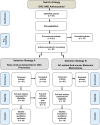Anthocyanins in Colorectal Cancer Prevention. A Systematic Review of the Literature in Search of Molecular Oncotargets
- PMID: 31281255
- PMCID: PMC6597886
- DOI: 10.3389/fphar.2019.00675
Anthocyanins in Colorectal Cancer Prevention. A Systematic Review of the Literature in Search of Molecular Oncotargets
Abstract
Background: Colorectal cancer (CRC) is the malignant process that surges in the terminal part of gastrointestinal tract when adenomatous polyps convert to neoplastic cells able to infiltrate the submucosa. Despite the constant progress in applying preventive measures (screening, colonoscopy) and developing new cures (surgical and chemotherapy), CRC is still one of the leading causes of cancer death worldwide. The importance of natural dietary components in CRC prevention has been recognized. Defining the precise role of the diet and its particular molecular moieties in CRC prevention is of constant scientific interest years behind. Anthocyanins (AC), phenolic phytochemicals present in pigmented plants and vegetables, have been reported to have some role in counteracting CRC carcinogenesis. Nonetheless, evidence coming out the pre-clinical, clinical, and epidemiological studies is still controversial. This review is addressing the need to better comprehend the causes of missing data and discrepancies in investigations on the role of dietary AC in modulating CRC carcinogenesis. Methods: We have analyzed the scientific literature, available in PubMed database, according to PRISMA (Preferred Reporting Items for Systematic Reviews and Meta-Analyses) statement methodology for systematic reviews. Subsequently, two selection strategies, with their screening and eligibility criteria, were applied to retain research articles reporting in vitro and in vivo studies aimed at exploring the molecular mechanisms underlying the observed effects of AC in CRC prevention. Results: From the pool of 82 identified publications, we selected 19 articles reporting experimental or observational data on the effect of AC-enriched diets in CRC prevention in humans or murine species. Furthermore, we selected 10 articles reporting about molecular mechanisms of action of pure AC in CRC experimental models. Conclusions: The major outcome of this review is that AC showed essentially no effect in human studies, whereas AC-enriched diets proved to be effective in experimental murine models of CRC. In cell culture tests, AC showed to interfere with cell signaling pathways related to cell growth and differentiation, apoptosis, oxygen stress, and inflammation response. Further molecular characterizations are required to include AC in the panel of disease-modifying agents.
Keywords: anthocyanins; colorectal cancer; diet; oncotargets; systematic review.
Figures
Similar articles
-
[SENTIERI - Epidemiological Study of Residents in National Priority Contaminated Sites. Sixth Report].Epidemiol Prev. 2023 Jan-Apr;47(1-2 Suppl 1):1-286. doi: 10.19191/EP23.1-2-S1.003. Epidemiol Prev. 2023. PMID: 36825373 Italian.
-
The preventive and therapeutic effects of anthocyanins on colorectal cancer: A comprehensive review based on up-to-date experimental studies.Food Res Int. 2023 Aug;170:113028. doi: 10.1016/j.foodres.2023.113028. Epub 2023 May 23. Food Res Int. 2023. PMID: 37316089 Review.
-
Fecal occult blood test for colorectal cancer screening: an evidence-based analysis.Ont Health Technol Assess Ser. 2009;9(10):1-40. Epub 2009 Sep 1. Ont Health Technol Assess Ser. 2009. PMID: 23074514 Free PMC article.
-
Protective Effects of Long-Term Usage of Cyclo-Oxygenase-2 Inhibitors on Colorectal Cancer in Genetically Predisposed Individuals and Their Overall Effect on Prognosis: A Systematic Review.Cureus. 2023 Jul 15;15(7):e41939. doi: 10.7759/cureus.41939. eCollection 2023 Jul. Cureus. 2023. PMID: 37588311 Free PMC article. Review.
-
Phenolic Phytochemicals for Prevention and Treatment of Colorectal Cancer: A Critical Evaluation of In Vivo Studies.Cancers (Basel). 2023 Feb 3;15(3):993. doi: 10.3390/cancers15030993. Cancers (Basel). 2023. PMID: 36765950 Free PMC article. Review.
Cited by
-
Anticancer Effects of Lingonberry and Bilberry on Digestive Tract Cancers.Antioxidants (Basel). 2021 May 26;10(6):850. doi: 10.3390/antiox10060850. Antioxidants (Basel). 2021. PMID: 34073356 Free PMC article. Review.
-
Anthocyanins in Chronic Diseases: The Power of Purple.Nutrients. 2022 May 23;14(10):2161. doi: 10.3390/nu14102161. Nutrients. 2022. PMID: 35631301 Free PMC article. Review.
-
Bioengineered Anthocyanin-Enriched Tomatoes: A Novel Approach to Colorectal Cancer Prevention.Foods. 2024 Sep 21;13(18):2991. doi: 10.3390/foods13182991. Foods. 2024. PMID: 39335919 Free PMC article. Review.
-
Protective effect of purple sweet potatoes (Ipomoea batatas L.) against rat breast cancer.Vet World. 2025 May;18(5):1137-1146. doi: 10.14202/vetworld.2025.1137-1146. Epub 2025 May 13. Vet World. 2025. PMID: 40584128 Free PMC article.
-
Correlation between antioxidant and anticancer activity and phenolic profile of new Apulian table grape genotypes (V. Vinifera L.).Front Plant Sci. 2023 Jan 11;13:1064023. doi: 10.3389/fpls.2022.1064023. eCollection 2022. Front Plant Sci. 2023. PMID: 36714705 Free PMC article.
References
Publication types
LinkOut - more resources
Full Text Sources



